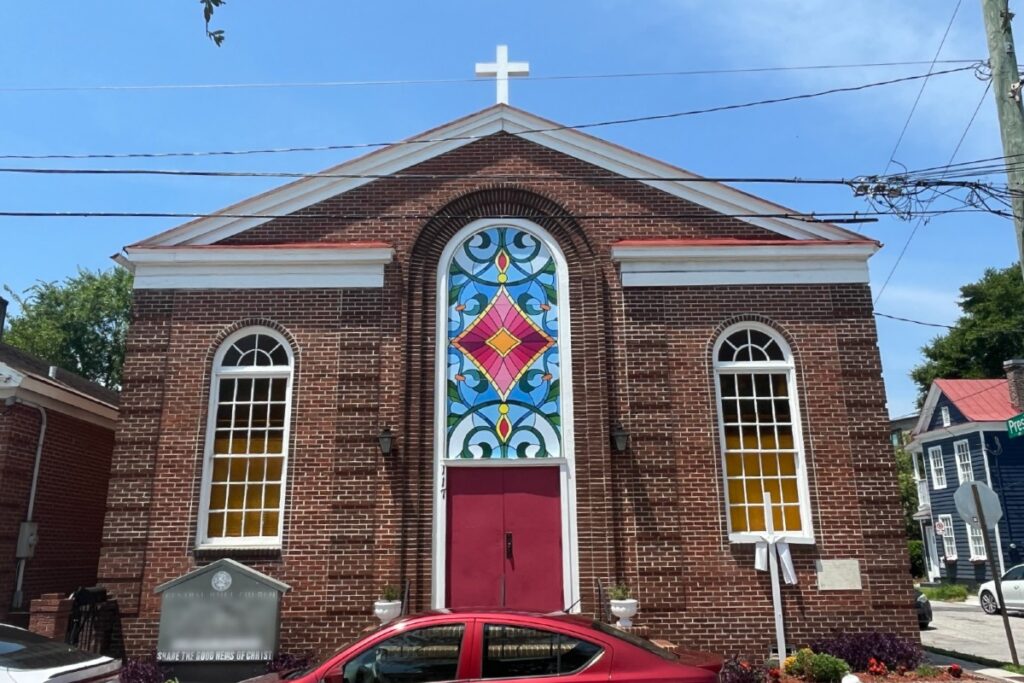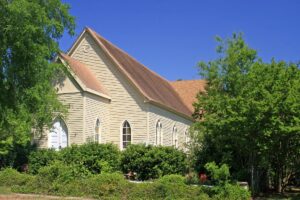STATEHOUSE REPORT | ISSUE 23.22 | May 31, 2024
BIG STORY: Despite education lottery, tuition still tough for somes
MORE NEWS: S.C. leaders react to Trump guilty verdict in hush money trial
LOWCOUNTRY, Ariail: Not kissing the ring
COMMENTARY, Brack: Put Trump verdict into real perspective
SPOTLIGHT: S.C. Institute for Independent Journalism
MYSTERY PHOTO: Red door
FEEDBACK: One-way freedom
Despite education lottery, tuition still tough for some

By Jack O’Toole | South Carolinians bought into the whole idea of an education lottery in 2002 as a way to ensure every Palmetto State high school student with good grades would be able to afford a college education at a state college or university.
But 22 years later – and despite more than $6 billion in lottery-funded scholarships – that goal is further out of reach than ever for thousands of the state’s highest-achieving students, according to recent research compiled by the Meeting Street Scholarship Fund. It supplements lottery scholarships for low-income students in 12 of South Carolina’s 46 counties.
“In 2002, the [lottery scholarship] award covered on average 105% of tuition and fees for a resident attending an in-state public college,” Meeting Street program director John Huber-MacNealy told Statehouse Report this week. “Today, given the rising cost of college, that award only covers 29%, so the impact of the scholarship just isn’t what it was when it was created.”
That’s why the fund is currently working to expand its program to all of the state’s counties. It’s also why it is recommending significant reforms in the state’s approach to lottery-funded scholarship programs.
Existing scholarships and a philanthropic ‘origin story’
Since its inception, the S.C. Education Lottery has funded three types of scholarships for college-bound South Carolina residents, all merit-based:
- The LIFE Scholarship provides $5,000 dollars to students attending an eligible state college or university. To qualify, students must have graduated from high school with a 3.0 or better grade point average (GPA), ranked in the top 30% of their class and scored at least 1100 on the SAT or 24 on the ACT. Students majoring in math, science, or health-related fields receive an additional $2,500.
- Designed as a bridge to the LIFE Scholarship, the HOPE Scholarship offers $2,800 to first-year college students with at least a 3.0 GPA in high school. If they maintain that 3.0 in their freshman year, they become eligible for a LIFE Scholarship in years two through four.
- The Palmetto Scholars Scholarship provides $7,500 to students in the top 6% of their class with at least a 3.5 GPA and 1200 on the SAT (27 ACT). Regardless of class rank, students can qualify with a 4.0 GPA and 1400 SAT (32 ACT). Again, math, science and health majors receive an additional $2,500.
According to Huber-MacNealy, the gulf between those numbers and the actual cost of an in-state college degree – about $10,000 difference per year, according to the latest data – that led Charleston philanthropists Ben and Kelly Navarro to start the Meeting Street Scholarship Fund in 2020.
“That $10,000 might as well be $100,000 to a lot of these students and families,” he said. “So, Ben and Kelly asked, ‘What can we do right now to help close that gap for these students who’ve worked so hard to put themselves in this position where they have a pathway to college?’ … That’s our origin story.”
Closing the gap
 Today, thanks to the Navarros’ commitment and additional resources from the Darla Moore Foundation, the fund works to close that gap by providing up to $10,000 a year for graduates of South Carolina public schools in 12 counties who qualify for a LIFE Scholarship and a federal Pell grant, which indicates significant financial need.
Today, thanks to the Navarros’ commitment and additional resources from the Darla Moore Foundation, the fund works to close that gap by providing up to $10,000 a year for graduates of South Carolina public schools in 12 counties who qualify for a LIFE Scholarship and a federal Pell grant, which indicates significant financial need.
The scholarship can be used for tuition, fees and room-and-board at any of the 17 South Carolina state colleges and universities that graduate at least 50% of their full-time students.
But Huber-MacNealy says even with plans to eventually expand Meeting Street to 46 counties, the state will have to do more to make college affordable and beneficial for many of South Carolina’s best students.
Specifically, he said he believes the state legislature needs to take action on two fronts: first, by making lottery-based scholarships more generous, and second, by strengthening accountability standards for state colleges and universities that want to receive those scholarship dollars.
“We would encourage lawmakers to consider changing the structure of these scholarships to not only increase award dollars to students who qualify,” Huber-MacNealy said, “but also to tie institutional eligibility to student success and on-time graduation rates. Right now there really is no distinction based on institutional success.”
Looking forward
State leaders agree the problem developed from 2002 to 2018, when legislators slashed non-lottery funding for state colleges while tuition more than doubled.
However, Gov. Henry McMaster has worked with the legislature to freeze tuition at state colleges since 2019, and to quadruple spending for needs-based financial aid over the same period, according to spokesman Brandon Charochak.
In addition, he pointed to a $3 million request in the governor’s most recent proposed executive budget to fund an independent top-to-bottom review of the state’s higher education system with an eye toward fundamental reform,“like the study commissioned for our healthcare agencies” last year.
The fate of the request, which was included in the S.C. House of Representatives’ 2024-25 state budget but left out of the Senate’s version, will be determined in June by a conference committee.
- Have a comment? Send to: feedback@statehousereport.com.
S.C. leaders react to Trump guilty verdict in hush money trial

By Statehouse Report Staff | Donald Trump became the first former president convicted of a felony Thursday. A New York jury found him guilty on 34 felony counts of falsifying records to cover up a sex scandal that threatened his ascent to the White House in 2016.
Many of Trump’s GOP allies, including several S.C. leaders, quickly responded to the verdict, lining up behind Trump as he’s likely to continue to be the party’s Republican nominee for November’s presidential election.
U.S. Sen. Tim Scott, R-S.C., whose name has been touted as a possible running mate, called the trial a “sham” and “absolute injustice” on X. “You cannot silence the American people,” he added. “You cannot stop us from voting for change. Joe Biden — you’re fired. We the People stand with Donald J. Trump.”
On the other end of the political spectrum, U.S. Rep. Jim Clyburn, D-S.C., responded to the trial simply with, “The jury has spoken. Justice has prevailed,” on X.
U.S. Rep. Nancy Mace, R-S.C., who has a primary June 11 against two GOP rivals in the First Congressional District, said on X, “This is a VERY dark day for American democracy when the law is weaponized against its own citizens. Now, it is in the hands of the American people to fix it.”
Other S.C. leaders such as Gov. Henry McMaster, Attorney General Alan Wilson and U.S. Sen. Lindsey Graham also responded to the verdict, accusing the trial of being an attack on the former president and criticizing the judicial system. Trump is expected to appeal the verdict.
In other recent headlines
![]() S.C.’s Supreme Court will soon have no Black justices. S.C. Court of Appeals Judge Letitia Verdin is set to be the next justice of the South Carolina Supreme Court after her remaining competition withdrew Thursday, making South Carolina one of 19 states with an all-White high court. “It’s shameful,” Orangeburg Democratic Rep. Gilda Cobb-Hunter said. “The people who appear before the bench are diverse. The judges they appear before should be diverse.”
S.C.’s Supreme Court will soon have no Black justices. S.C. Court of Appeals Judge Letitia Verdin is set to be the next justice of the South Carolina Supreme Court after her remaining competition withdrew Thursday, making South Carolina one of 19 states with an all-White high court. “It’s shameful,” Orangeburg Democratic Rep. Gilda Cobb-Hunter said. “The people who appear before the bench are diverse. The judges they appear before should be diverse.”
McMaster signs gender-affirming care ban, child online safety bill. Gov. Henry McMaster officially signed the “Help Not Harm” bill, which prohibits healthcare professionals from knowingly providing gender-affirming care, like puberty-blocking drugs and hormones, to a person under 18-years-old.
What S.C. lawmakers did and didn’t do to ease teacher shortages. The General Assembly is taking a big step this year, boosting the statewide minimum by $4,500 to $47,000 in the next state budget, putting South Carolina within reach of hitting McMaster’s goal a year early.
S.C. legislation that could have increased voter turnout, sped up results dies. Legislation that could have increased turnout in South Carolina’s local elections while speeding up Election Day tallying died in the final minutes of this year’s regular session, despite both chambers approving it overwhelmingly.
S.C. legislative panel approves $3.6M to protect 5,500 acres of land. A 4,400-acre stretch of land in Jasper County and a roughly 1,100-acre farm where scenes from “The Patriot” were filmed are set to be preserved with help from state taxes.
Solution for S.C. venues’ liquor liability woes stalled in Statehouse. Lawmakers called for a last-ditch, improbable attempt to put the issue of lawsuit reform on the docket for this summer.
S.C. lawmakers consider on-site childcare services for workers. South Carolina is considering a plan to offer on-site childcare services to some state workers, a move the Department of Social Services says would be for the first time ever.
Not kissing the ring

Nationally award-winning cartoonist Robert Ariail always has an interesting take. This week, he takes on the recent endorsement of GOP nominee by a former presidential challenger, Nikki Haley of Kiawah island. What do you think – love the cartoon? Hate it? Send your thoughts to feedback@statehousereport.com.
Put Trump verdict into real perspective

By Andy Brack | Now that Donald Trump has become the first former president convicted of crimes, it’s safe to say America’s political polarization may be at a tipping point.
 People’s reactions are all over the place. Some are gloating, figuring the bully Trump finally got what he deserved. Some are mad – really mad – because their hero didn’t prevail before a New York jury who heard days of testimony related to politics and a scheme to hush up a hook-up just before the 2016 election.
People’s reactions are all over the place. Some are gloating, figuring the bully Trump finally got what he deserved. Some are mad – really mad – because their hero didn’t prevail before a New York jury who heard days of testimony related to politics and a scheme to hush up a hook-up just before the 2016 election.
Some, including our foreign allies, are relieved that the American system of accountability seemed to work and that no one is above the law. And yet others are just sick of it all, not really caring one way or the other about the guy who has sucked the oxygen out of political space for the last decade.
There’s not really any wrong or right reaction, but it would make sense for liberals to back off gloating and conservatives to curb their anger. Otherwise, our off-the-rails country is going to stay politically out of whack.
So regardless of how you feel, maybe there’s a mind exercise for you that can help you get beyond any visceral reaction.
Imagine you have a neighbor – or a business acquaintance, fellow church member, friend, drinking buddy or colleague – who has gotten in some serious trouble. You don’t know if he or she did what they are accused of, but you believe them when they said they didn’t do it.
Months pass. Your neighbor goes to trial. He or she is found guilty by a jury of local people, just as happens countless times across America every week.
So how do you react? Do you gloat? (“I didn’t really like him anyway; I’m not surprised.”) Do you get angry? (“She was railroaded; the system isn’t fair.”)
Or do you move on with your life, perhaps disappointed in your neighbor, but accepting that he or she had a chance to air a version of the case in a court of law where a jury of regular people listened and took a different view?
It’s interesting that many of Trump’s supporters who are local, state and national leaders continue to buy the dishonest narrative that the 2020 presidential election was stolen from him.
But if you step back and look at that whole notion from 20,000 feet, it is pretty preposterous because of its duplicity. On one hand, they’re saying the voting system corrupted the results of one election, the presidential election. But on the other hand, they’re accepting the results of thousands upon thousands of other elections – including their own that put them into office – and they’re NOT saying those elections were corrupt.
Bottom line: America’s system of governance and judicial review should work the same for everyone, regardless of whom they are.
Trump is just a man, not a demi-god. That’s what the results of the trial showed.
So as you reflect on what’s happening with a case that’s ripping apart America, don’t gloat or get mad. Rather, try to put things in perspective based on your life’s experience. There’s a pretty good chance that the results of this instance of judicial accountability is little different than what everyone else in trouble goes through. This time, Trump lost. He may lose again. But he had his chance in court to make his case.
And then when you head to the polls in November, cast your ballot in a way that will allow the country to adhere to time-proven principles of freedom – or not.
We hope you’ll pick the tenets of democracy in the U.S. Constitution and Bill of Rights, not a politically-tailored narrative to give special treatment to anyone.
Andy Brack is editor and publisher of Statehouse Report and the Charleston City Paper. Have a comment? Send to: feedback@statehousereport.com.
S.C. Institute for Independent Journalism
 Statehouse Report is brought to you for free thanks to underwriters like the South Carolina Institute for Independent Journalism, which supports the development and production of independent and nonprofit news in South Carolina to promote democratic ideals.
Statehouse Report is brought to you for free thanks to underwriters like the South Carolina Institute for Independent Journalism, which supports the development and production of independent and nonprofit news in South Carolina to promote democratic ideals.
SCIIJ achieves its mission by providing financial and organizational support to community publications; operating civic engagement initiatives; training promising journalists; and producing bold independent journalism.
Red door

Here’s a church somewhere in South Carolina. What and where is it? Send your name, hometown and guess to: feedback@statehousereport.com.
 Last week’s mystery, “Surrounded by greenery,”showed Union Church, which was built in 1910 in the Newry mill village in Oconee County. Thanks to Bill Segars of Hartsville for providing the photo
Last week’s mystery, “Surrounded by greenery,”showed Union Church, which was built in 1910 in the Newry mill village in Oconee County. Thanks to Bill Segars of Hartsville for providing the photo
Pat Keadle of Wagener shared it was called “The Union” because it served all denominations. Today, she said, there are only remains of the former mill village, which has been designated as a national historic district.
Few other people correctly identified the church, so a special tip of the hat to Allan Peel of San Antonio, Texas; George Graf of Palmyra, Va.; and Elizabeth Jones of Columbia.
- Send us a mystery picture. If you have a photo that you believe will stump readers, send it along (but make sure to tell us what it is because it may stump us too!) Send to: feedback@statehousereport.com and mark it as a photo submission. Thanks.
One-way freedom
To the editor:
![]() Thank you for your column on the “Freedom Caucus.” The only kind of freedom these fools and ninnies are interested in is the freedom to force their convoluted ideas about morality down everybody else’s throats.
Thank you for your column on the “Freedom Caucus.” The only kind of freedom these fools and ninnies are interested in is the freedom to force their convoluted ideas about morality down everybody else’s throats.
The sooner we can send these troglodytes back where they came from, the safer we’ll all be.
– Gere B. Fulton, Columbia, S.C.
Send us your thoughts
We encourage you to send in your thoughts about policy and politics impacting South Carolina. We’ve gotten some letters in the last few weeks – some positive, others nasty. We print non-defamatory comments, but unless you provide your contact information – name and hometown, plus a phone number used only by us for verification – we can’t publish your thoughts.
- Have a comment? Send your letters or comments to: feedback@statehousereport.com. Make sure to provide your contact details (name, hometown and phone number for verification. Letters are limited to 150 words.
- ORDER NOW: Copies are in Lowcountry-area bookstores now, but if you can’t swing by, you can order a copy online today.
- Now available as an e-book!
ABOUT STATEHOUSE REPORT
Statehouse Report, founded in 2001 as a weekly legislative forecast that informs readers about what is going to happen in South Carolina politics and policy, is provided to you at no charge every Friday.
- Editor and publisher: Andy Brack, 843.670.3996
- Statehouse bureau chief: Jack O’Toole
Donate today
We’re proud to offer Statehouse Report for free. For more than a dozen years, we’ve been the go-to place for insightful independent policy and political news and views in the Palmetto State. And we love it as much as you do.
But now, we can use your help. If you’ve been thinking of contributing to Statehouse Report over the years, now would be a great time to contribute as we deal with the crisis. In advance, thank you.
More
- Mailing address: Send inquiries by mail to: P.O. Box 21942, Charleston, SC 29413
- Subscriptions are free: Click to subscribe.
- We hope you’ll keep receiving the great news and information from Statehouse Report, but if you need to unsubscribe, go to the bottom of the weekly email issue and follow the instructions.
- Read our sister publication: Charleston City Paper (every Friday in print; Every day online)
- © 2024, Statehouse Report, a publication of City Paper Publishing, LLC. All rights reserved.


